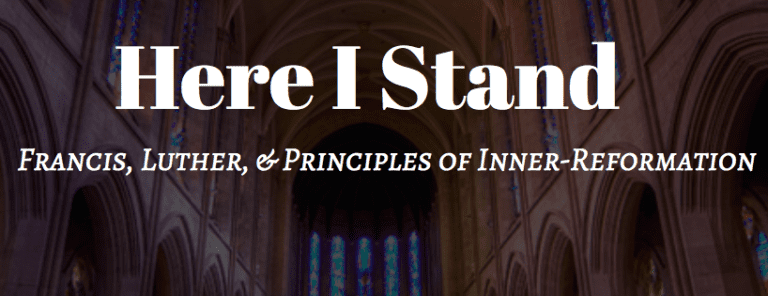This is the fifth installment of a series of blog posts outlining principles of inner-reformation taken from the life of St. Francis and Martin Luther. This series was prepared as a series of talks for the Order of Lutheran Franciscans 2017 Retreat.
Inner Reformation Principle 4: Embrace Simplicity
The fourth step towards spiritual reformation is to embrace humility, non-judgment, and simplicity.
Both Francis and Luther were raised in religious systems that valued complexity, austerity, and gaudiness. All religious systems have the tendency to move towards judgementalism, hyper-complexity, and sheer egoic pride. Our doctrines begin to favor us versus them, roles and levels of spiritual maturity emerge in the form of systems that privilege a few and oppress many, and we become so caught up in defining the indefinable and being proud of just how much we know. This is the kind of Christianity that both Francis and Luther found themselves in, and it was this tangled web of shallow religiosity that resulted in their profound disillusionment and dissatisfaction with faith and life.
Both men found themselves on the top of the religious and social hierarchy early on in their lives, and much like the story of Siddhartha Gautama (who became known as the Buddha), they were protected from suffering of the world around them that resulted from the religious and social systems that privileged them over the rest of society. But as is often the case, the privileged life loses its luster and is revealed to be vapid and lacking substance, and both men found themselves in a posture of seeking a more meaningful life. As they entered into contemplation and reflection, the Spirit nudges each man to see how truly simple the path to salvation truly is- it is nothing more than sheer faith in the grace and love of God, and the embodiment of that grace to the world.
When Francis awakened to this simple path, he sold everything he had and went to preach among the poor and marginalized. Through this process, he experienced the gradual death of his False Self and moved from a posture of judgment to non-judgment, recognizing that he was interconnected with and related to all Created things. No one was above another, and all were equally loved and embraced by God.
When Luther awakened to the potency of God’s grace and the simplicity of salvation by faith, he rejected the creeds and hierarchies of the Church in order to preach a Gospel message that was truly good news of great joy for all people. A message that freed the poor from exploitation and held the mirror of Jesus in the faces of the religious hierarchy, revealing the injustice of their religion. His goal was never to leave the Church, but to call it back to the simple path of salvation that Jesus demonstrated, beyond the greed and theological complexity that the Church had embraced as holy.
Neither man actively sought to be a “reformer”. Neither sought to gain followings. Both only sought to be obedient to the Spirit and faithful to their convictions. But as they embraced the radically simple, humble, non-judgmental way of Jesus, others noticed and were drawn to follow. By living in the joy that comes from simplicity and humility, they put the Church to shame and drew all those who were feeling the shallowness and incongruence of the institutionalized religion with that of the life and teachings of Jesus.
As biographer of St. Francis, Donald Spoto notes, “Francis proclaimed peace, when others proclaimed warning.” This was they key to his impact. He refused to fall into the practices of the religious leaders of his day, who preached condemnation and conformity, but instead, proclaimed that the peace of God was available to all, and that all could participate in the Kingdom of God through the simple realization of the grace and mercy that was already encompassing each one of us.
If we are to begin to allow the Spirit of God to bring about a reformation of Spirit within us, we must abandon our attachment to things, to power, to wealth, and instead, embrace the radically simple path that Jesus embodied, the path that calls us to trust in our Heavenly Parents provision, to recognize the brotherhood that we share with all people and all created things, and to live a life infused with grace, acknowledging the journey that each and every person is on towards reformation and redemption.
When we embody these traits, we become beacons of the light of Christ and many will be drawn to the rhythm that we live our lives to. This is the best evangelism that one could hope for, and that path that Jesus himself favored. Our inner peace begets outer peace, our inner simplicity, begets outer simplicity, and when we leave behind toxic theologies that teach of God’s judgment on those who don’t conform to the desires of a Church, we experience the sheer liberation that comes from knowing that God’s posture towards us is only and always Love, and that nothing can separate us from that fundamental reality.












